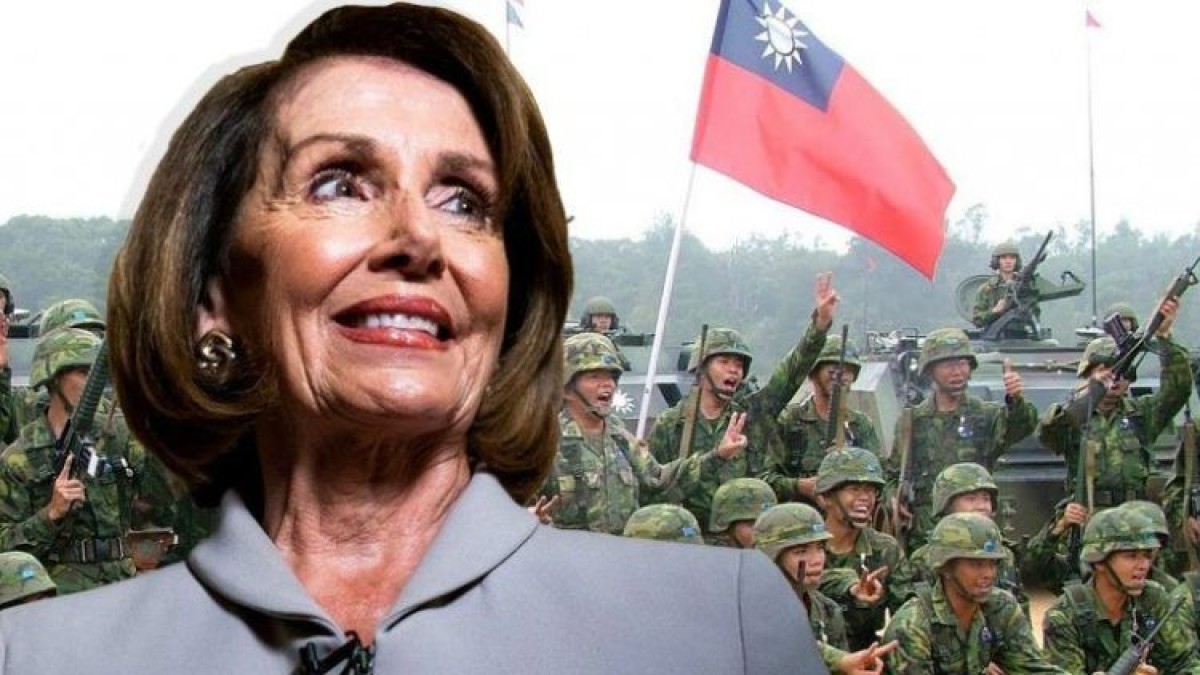 121
121
Eventually, after much conjecture and uncertainty, Nancy Pelosi, the 82-year-old Speaker of the United States House of Representatives, arrived in Taipei City, the capital of the breakaway island of Taiwan. The gravity of Pelosi’s visit is underscored as the most prominent US official to set foot in Taiwan since former House Speaker Newt Gingrich visited the island in 1997.
Many commentators believe Pelosi has become a germination point for Biden’s anti-China agendas.
The apocalyptic vision of the China-US war over Taiwan seems eerily pertinent today, following Pelosi’s provocative Asian tour amid worldwide turmoil sparked by the Ukraine conflict and the escalating tensions between the United States and its Western allies vis-à-vis Moscow.
For decades, China maintains that self-ruled Taiwan is a part of China and considers it a renegade province and has even threatened to use force if it moves toward a permanent split.
In the midst of the exponential rise of China and its increasing exercise of political and military power, it is expected that the Biden administration will also continue Obama’s policies to contain China and turn US strategic attention to East Asia. Likewise, Biden is cognizant that if Washington fully adopts the “One China” policy, the military manoeuvrability of the United States and its allies in that strategic part of the world will be dramatically diminished.
In this context, According to political pundits, South China establishes modern political power equations in the military, economic and even demographic spheres, all of which have the potential to influence the world system over the following decades significantly.
Biden is aware that if he backs down on the Taiwan-China crisis and the strategy of constant pressure on China in East Asia, the US allies across the globe would undoubtedly question the sincerity and integrity of the United States, thereby inevitably making a screeching U-turn toward wealthy Beijing.
Hence, Pelosi’s trip was a deliberate, vicious challenge for the Chinese, despite their inflammatory, bellicose warnings. The fact is that Washington sought to demonstrate its both political and military power against China to invalidate the notion held by Beijing that the US was no longer than a paper tiger.
Meanwhile, American policymakers acknowledge that China’s position drastically differs from Russia’s. China is a country with a GDP of $17 trillion and a thriving economy. It has more economical, demographic and diplomatic clout compared to the oil-based Russian economy and cannot be easily thwarted. Moreover, Western sanctions against Russia cannot be easily implemented against Beijing. Therefore, the US only seeks to exert more pressure on Taiwan and its 180 km strait by playing various politico-economic cards.
Anticipating the tactful, albeit indignant, Chinese reaction to Pelosi’s visit to Taiwan by Beijing’s lacklustre backing for Russia’s special military campaign in Ukraine, Beijing will probably avoid any unexpected mêlée with the Americans.
On the other hand, neither Americans nor Chinese seems to be pursuing the option of war, as both nations possess substantial nuclear capabilities. Consequently, the current tensions will probably be contained, but the United States will endeavour ceaselessly to curb China’s influence as much as possible.
So, it is extremely doubtful that the Chinese would engage militarily with the United States over Pelosi’s visit, which is viewed as a subterfuge to prevent the Chinese dragon from raising its head. Therefore, it would be unwise for the smart Chinese to wage war with the United States over a small island.
When the COVID-19 pandemic was ravaging the Western economy, China had a period of remarkable economic progress and could outcompete the United States in several technical fields. Currently, the Chinese are stockpiling gold to boost their national currency, the Yuan, and continuing their struggle against the dollar’s hegemony. If this pattern continues, China will soon overtake the United States as the largest economy in the world within the next few years, if not decades. So why must China enter an unpredictable military conflict with the US and the Europeans while their fragile economies and energy supplies are already on the verge of collapse?
It would be remiss not to mention that if Taiwan were a member of the UN and planned to join a military alliance akin to NATO, China, like Russia, would not have hesitate an assault on the island for even one day. Thus, the Taiwan and Ukraine cases are completely incomparable.
To summarise, the Chinese-Taiwan conflict will inexorably widen, undermining regional stability and further constraining Sino-American relations.
Comment
Post a comment for this article